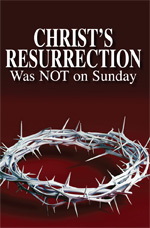In this Scripture, Christ expressly says, “And other sheep I have, which are not of this fold: them also I must bring, and they shall hear My voice; and there shall be one fold, and one shepherd.”
It is important to notice that Christ made the distinction as other sheep…not of this fold. “This fold” refers to the Jews who were living in Judea at that time. Jesus, being of the tribe of Judah, brought the Gospel message, from the Father, to His own people first. They rejected both the Messenger and the Message. In the “parable of the ten pounds” in Luke 19:14 we read, “But his citizens hated him, and sent a message after him, saying, ‘We will not have this man to reign over us.’” Even more brutal is the account of Matthew 27:25 where they said, “His blood be on us, and on our children.”
We are left then, with the “other sheep…not of this fold.” Throughout the Bible, God refers to the people of Israel as His sheep. There is no indication that this is referring to the Gentiles. Those other sheep are the other tribes of Israel. We find in Matthew 10:6 Christ’s instruction to His disciples, “But go rather to the lost sheep of the house of Israel.” The apostle James directly addressed the “lost tribes of Israel” in James 1:1, “…to the twelve tribes which are scattered abroad…” The Jews also made the same reference in John 7:35: “…will He go unto the dispersed among the Gentiles?”
Israel was one united nation until the reign of King Rehoboam. Under Jeroboam, ten tribes separated from Rehoboam to form a new nation called Israel. The remaining tribes with Rehoboam formed a nation that was known as the kingdom of Judah. They have not been united since.
John 10:16 does give a happy, glorious conclusion. Christ said, “…them also I must bring, and they shall hear My voice; and there shall be one fold, and one shepherd.” In Ezekiel 37:21-28, we find a very inspiring and detailed prophecy of the final reunion of the tribes of Israel, with David as their resurrected King under the Master Shepherd, Jesus Christ.


















